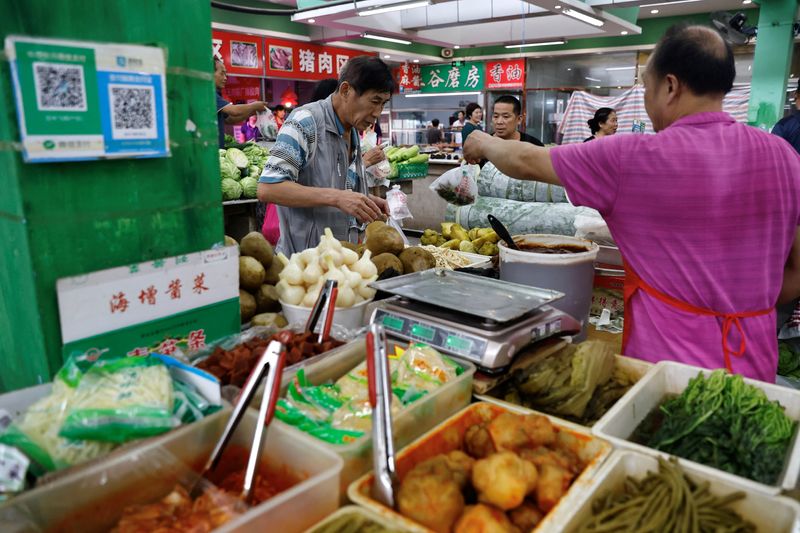
© Reuters. FILE PHOTO: A pickle vendor attends to a customer at a morning market in Beijing, China August 9, 2023. REUTERS/Tingshu Wang/File photo
BEIJING (Reuters) – China’s consumer prices faltered and factory-gate prices shrank slightly faster than expected in September, with both indicators showing persistent deflationary pressures in the world’s second-largest economy.
The consumer price index (CPI) was unchanged in September from a year earlier, data by the National Bureau of Statistics (NBS) showed on Friday, missing the forecast of a 0.2% gain in a Reuters poll. CPI rose 0.1% in August.
Year-on-year core inflation, excluding food and fuel prices, was 0.8%, in line with August.
The producer price index (PPI) fell 2.5% from a year earlier, the 12th straight month in negative territory though the pace of decline slowed from August. Economists had predicted a 2.4% fall in September.
“CPI inflation at zero indicates the deflationary pressure in China is still a real risk to the economy. The recovery of domestic demand is not strong, without a significant boost from fiscal support,” said Zhiwei Zhang, chief economist at Pinpoint Asset Management. “The damage from the property sector slowdown on consumer confidence continues to weigh on household demand.”
Food prices dropped 3.2% from a year earlier, extending a decline by 1.5 percentage points from August and dragging down the CPI. Pork prices shrank 22%, a sharper decline than a 17.9% drop in August.
While signs are emerging that China’s economy is stabilising, concerns over the sustainability of the recovery persist.
The IMF on Tuesday lowered its growth forecasts for China for this year and next, due to the country’s property crisis and weak external demand.
China’s property sector has yet to emerge from a deep slump despite a raft of policy support measures.
Travel during the recent mid-Autumn and National Day holiday period edged up 4.1% from pre-pandemic 2019 levels, although this was short of official estimates.
China has rolled out a series of policy measures in recent months to revive a stumbling economy after its post-pandemic recovery slowed to a crawl.
To revive investor confidence, China’s “Big Four” state banks announced on Wednesday stake increases by their state parent, Central Huijin Investment Ltd.








